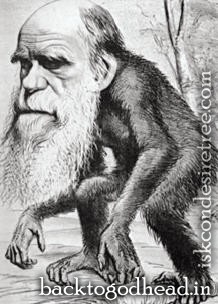
As we see it, however, the Darwinian hypothesis on the transformation of the living world is but one of several possible interpretations of the facts. It may explain minor variations within species, but does not offer a scientifically proven explanation of how major new features of organisms can arise.
Moreover, there is evidence that contradicts the theory. For example, in their book Forbidden Archeology, Michael A. Cremo (Drutakarma Dasa) and Richard L. Thompson (Sadapüta Dasa) document archeological discoveries that cast doubt on the idea that species as we now know them emerged by transformation of earlier species by evolution.
In another area, scientists have applied mathematical statistical analysis to the discoveries made in the last few decades in the field of molecular biology. Their analysis shows that the spontaneous origin of a single-celled organism from chemicals is highly unlikely so unlikely, in fact, that it should be considered impossible.
Hare Krishna devotees regard the ancient Vedic scriptures as a reliable source of knowledge about the origin and ultimate questions of existence. These scriptures are part of the most ancient heritage of humankind, and their followers accept them as divine revelation. According to the Vedic literature, our world and the species in it emerged by a process of creation. The various bodily forms were all brought forth at the beginning of creation (many millions of years ago); they did not evolve sequentially, one from the other. These bodies are vehicles for spirit souls, which provide the life force and consciousness.
Ideas about the origin of life and our species greatly influence our civilization. In the public education systems of the world, we are for the most part taught that our origin as human beings can be explained by a purely materialistic process of evolution that does not involve either God or the soul. People influenced by such ideas, even if nominally religious, may neglect guidance given by the Supreme Person and pursue exclusively materialistic, selfish goals. Because of unlimited material desires, ethical standards fall and people increasingly exploit the environment and their fellow beings. The materialistic, evolutionist view is thus partly responsible for the economic, environmental, and food crises looming over humankind.
Some people propose that evolution theory be integrated into religious teachings. Evolution, they say, is God’s method of creation. The scriptures of the monotheistic religions, taken literally, profess the direct creation of both the living and the inanimate worlds. We see no reason to mix the unproven theory of evolution with the wisdom of revelation. The role of religions in society is to consistently represent divine truth rather than make compromises with the dominant (and ever-changing) materialistic views of the day.
People with the power to influence opinion should take steps to allow a more balanced discussion of life, broadening the dominant, practically exclusive, evolutionist approach in education and mass communication. They should present Darwinian thought not as “The Explanation” but rather as one hypothesis with its own problems and limitations. And they should present divine creation as a justified and rational alternative.
Leaders of society politicians, teachers, intellectuals have the responsibility not only to look after the physical and cultural needs of the members of the society but also to work toward people’s moral and spiritual progress. Philosophical materialism, rooted in evolution theory, is unproven, its validity questioned by an ever-increasing number of thinkers. Unfortunately, its general acceptance today weakens the moral and ethical standards of society, promotes a recklessly wasteful model of consumption, and spreads disrespect for life.
